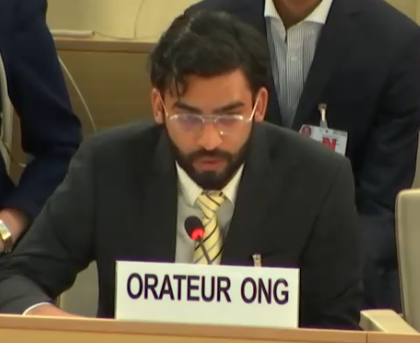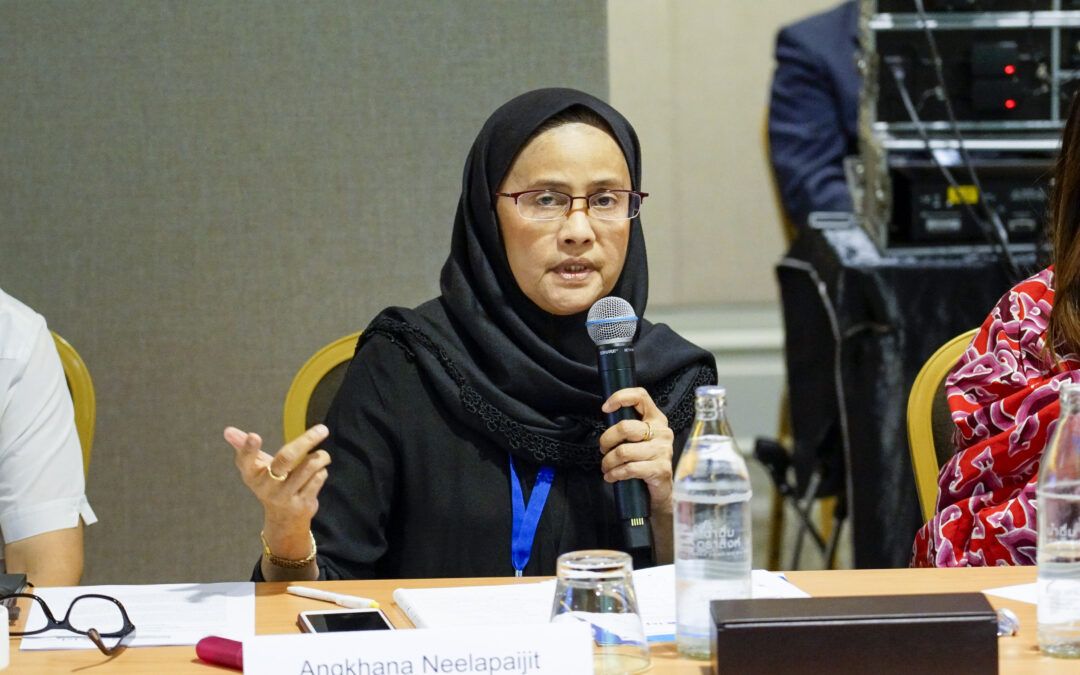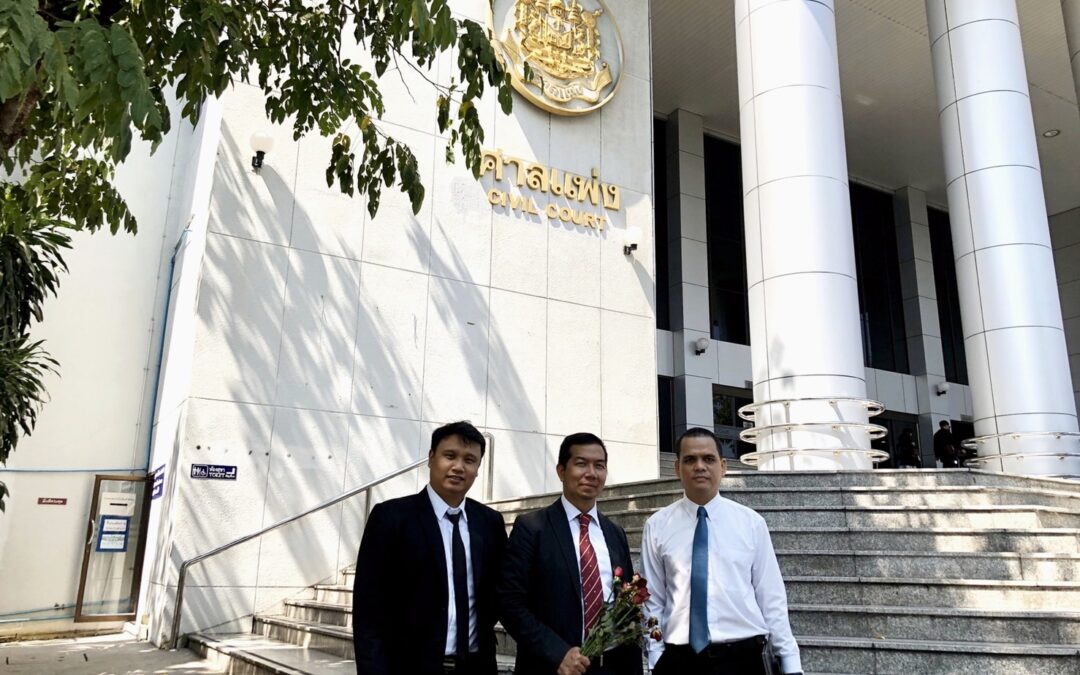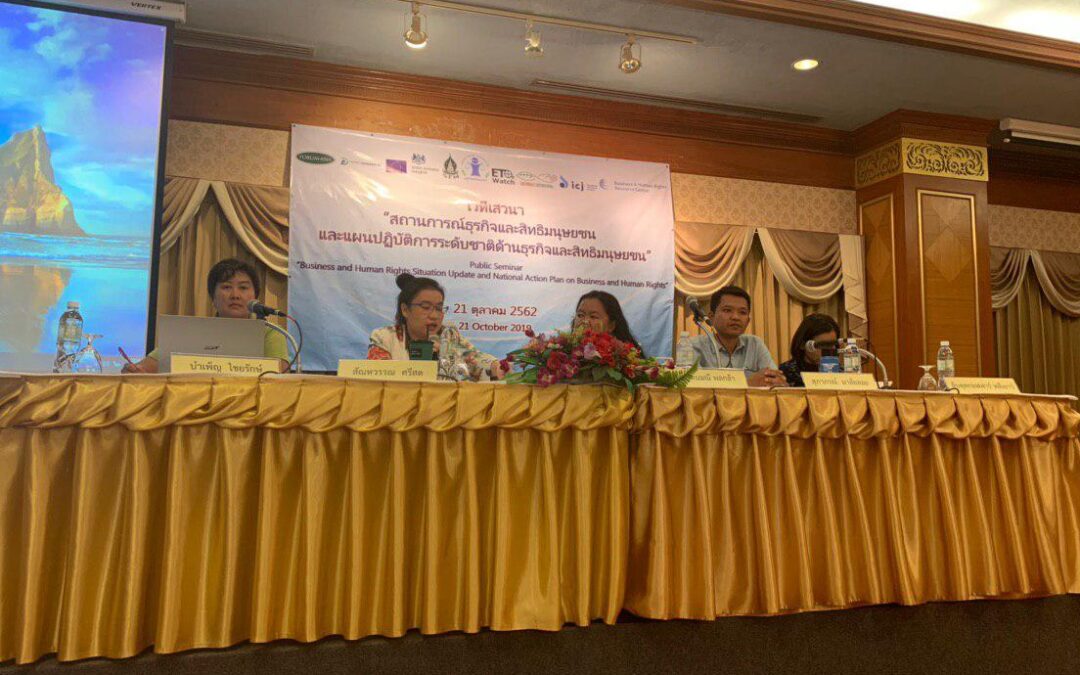
Mar 6, 2020 | Advocacy, Non-legal submissions
The ICJ, speaking in a general debate at the UN Human Rights Council in Geneva, urged all States to work together towards adoption of a treaty on business and human rights, and highlighted threats to the independence of the judiciary in Europe.
The statement, delivered in the general thematic debate at the Council, read as follows:
“The International Commission of Jurists (ICJ) welcomes the report of the 5th session of the Intergovernmental Working Group (A/HRC/43/55) in charge of the elaboration of a treaty on business and human rights and notes the consensual nature of its conclusions and recommendations. Abuses of human rights and environmental degradation caused with the involvement of business enterprises have so far been met with very limited action by businesses and States.
The ICJ considers that the revised draft treaty is a serious and advanced proposal that is suitable for negotiations and thanks the Chair-Rapporteur for its efforts and leadership in this process.
The ICJ urges States that are not yet actively involved in the negotiations to join the growing number of States that are active for a final push.
The ICJ also draws the attention of the Council to serious threats to independence of judges and lawyers in European countries.
In Poland, judges are being disciplined merely for applying EU law, under legislation curtailing their freedom of expression and independence.
In Turkey, independence of lawyers and judges continues to be seriously compromised, as demonstrated by the disciplinary proceedings against the Gezi trial judges launched after critical comments by the President of Turkey.
The ICJ urges the Council to give attention to these developments of extreme concern.”

Feb 28, 2020 | News
The ICJ today welcomed the judgement of the Canadian Supreme Court in the Case of Araya v, Nevsun, which allows a civil lawsuit by a group of Eritrean plaintiffs to proceed against Canadian company Nevsun Resources Ltd. for its alleged involvement in forced labour, slavery, torture and other serious human rights abuses against plaintiffs.
The ICJ together with Amnesty International-Canada intervened in the case as a third party, arguing that Canada’s common law should be read in a manner consistent with the right to an effective remedy for human rights violations under international law and the Canadian Charter of Rights and Freedoms.
“This judgment is a landmark achievement for workers and other victims of human rights violations as well for international rule of law and justice,” said Carlos Lopez, Senior Legal adviser at the ICJ.
“The Supreme Court of Canada has shown that misapplied legal doctrine should not stand in the way of people’s right to effective remedy and reparations,” he added.
In the case, the Supreme Court of Canada rejected the company’s contention that the “act of state doctrine” would preclude the case from going forward.
The Court concluded that this doctrine is not in fact part of Canadian law.
The company also contended that the allegations of breach of customary international law could only be applicable to States and not to the company itself.
The Court, however, held that customary international law, including customary human rights law, is part of Canadian law and could apply to Nevsun as a corporate entity.
In a significant victory for the plaintiffs and other similarly situated alleged victims, the Supreme Court has allowed the case to proceed, dismissing jurisdictional and procedural objections from Nevsun.
The proceedings before the Supreme Court originated in an appeal by the defendant company Nevsun Resources Ltd against the British Columbia Court of Appeal’s judgment of 2017 which upheld the rights of claimants to sue in Canada.
The claim filed in 2015 argued that Nevsun Resources was involved in various ways in the practice of forced labour, slavery, torture, cruel, inhuman or degrading treatment, and crimes against humanity at the Bisha mine (picture) against hundreds of Eritreans who were conscripted into the Eritrean National Service Programme and forced to working in the mine operated jointly by Nevsun and Eritrean State companies.
The claimants were allegedly forced to work in the Bisha mine and fled the country to find refuge in Canada, where they sued Nevsun.

Nov 27, 2019 | News
Today, the ICJ condemned Thammakaset Co., Ltd’s use of the criminal defamation provisions of the Thai Criminal Code to harass former National Human Rights Commissioner Angkhana Neelapaijit.
“This action by Thammakaset is a textbook case of how defamation laws are used in Thailand to silence human rights defenders. It is clearly without any legitimate basis, and intended to harass and intimidate Khun Angkhana, who is a leading champion of human rights in Thailand and the region,” said Frederick Rawski, ICJ Asia Pacific Regional Director. “We hope that the Courts will dismiss this frivolous case at first opportunity.”
On 25 October 2019, Thammakaset Co. Ltd., a poultry farm in Lopburi Province, filed a criminal defamation suit under sections 326 and 328 of the Criminal Code against Angkhana Neelapaijit for two posts she shared that contained links to press statements of 16 organizations, including the ICJ, and Fortify Rights.
The statements cited in the warrant as the basis for the action were a post on 3 December 2018 in which Angkhana Neelapaijit re-tweeted an ICJ link to a joint statement co-signed by 16 organizations, including the ICJ. The statement contained a link to a short film in which former employees spoke out about alleged labor abuses; and a post on 28 June 2019 which included a link to a Fortify Rights’ news release containing the same link. The film refers to a previous defamation complaint brought by Thammakaset against 14 of its former workers, and called upon the authorities to drop criminal defamation charges against them and decriminalize defamation in Thailand. Thammakaset claimed that the film was defamatory.
Criminal defamation, under sections 326 of the Criminal Code, carries a maximum sentence of one year of imprisonment, a fine of up to 20,000 Baht (approx. USD 640) or both. Section 328 criminalizes defamation “by means of publication” with up to two years’ imprisonment and a fine of up to 200,000 Baht (approx. USD 6,400).
Thailand is party to the International Covenant on Civil and Political Rights (ICCPR), which guarantees the right to freedom of expression. The UN Human Rights Committee, the supervisory body that provides the authoritative interpretation of the ICCPR, has called on States that criminalize defamation to abolish criminal defamation laws and reserve defamation for civil liability.
“The criminal defamation provisions in the Criminal Code have been repeatedly invoked for nefarious ends, such to target persons seeking to bring public attention to human rights violations, including by business enterprises. They need to be removed from the Criminal Code as a matter of urgency,” said Rawski. “The imposition of criminal penalties for speech, even allegedly defamatory speech, is disproportionate and risks having a ‘chilling effect’ on the exercise of freedom of expression.”
Further reading
Thailand: Drop defamation complaints against human rights defenders Nan Win and Sutharee Wannasiri
Thailand: ICJ and LRWC submit amicus in criminal defamation proceedings against human rights defenders Nan Win and Sutharee Wannasiri
Contact
Frederick Rawski, ICJ Asia-Pacific Director, t: +66 64 478 1121; e: frederick.rawski(a)icj.org
***
Download the press-release with additional information in English and Thai. (PDF)

Nov 12, 2019 | News
Today, the ICJ condemned the use of civil proceedings to harass Nakorn Chompuchart and Sira Osottham, lawyers representing labour rights researcher Andy Hall.
The ICJ called on Thailand to take measures to protect lawyers so that they can perform their duties without intimidation, harassment or improper interference.
On 12 November 2019, the Bangkok Civil Court conducted its first hearing in a tort case under the Civil and Commercial Code by a Thai fruit processing company, Natural Fruit Company Ltd. (‘the Company’), against the lawyers. The two lawyers represent Andy Hall in several criminal and civil proceedings brought against him seeking damages claimed to have resulted from his research into labour rights abuses allegedly committed by the Company. In the lawsuit against the lawyers, the Company is seeking 50 million Thai baht (approximately 1.65 million USD) as compensation for lost business.
“This legal action is part of a pattern of harassment by Natural Fruit against Andy Hall,” said Frederick Rawski, ICJ Asia Pacific Regional Director. “It is a bedrock principle of the rule of law that lawyers should not be identified with their clients or their clients causes as a result of discharging their function.”
In the complaint, Natural Fruit claims that Andy Hall and his lawyers “excessively exercise their rights”, “intentionally damage the Company’s reputation”, and “caused financial loss in their business” when they brought a case in 2017 against the Company, the Company’s lawyers, and public prosecutor for allegedly “giving false testimony” and “filing false complaint” in other criminal proceedings. The case was dismissed by the Supreme Court who was of the view that the Company exercised its right in good faith.
“This is not the first time in Thailand that lawyers have faced the unwarranted threat of criminal or civil prosecution when representing their clients,” said Rawski. “As with the criminal proceedings brought against Sirikan “June” Charoensiri for her professional activities as a lawyer, such vexatious actions set a precedent that endangers the ability of lawyers to effectively represent their clients. The government must take prompt and effective measures to ensure that the safety and independence of lawyers is guaranteed in law and in practice.”
Background
This case was also initially brought against Andy Hall, but was later withdrawn because the Court could not send court writs to Andy as he does not reside in Thailand.
Criminal and civil proceedings have brought against Andy Hall were in relation to the report of a Finnish NGO, Finnwatch, published in January 2013, called Cheap Has a High Price, which alleged that labour rights violations were taking place at Natural Fruit Company.
Thailand is a party to the International Covenant on Civil and Political Rights (ICCPR). Article 14 of the ICCPR guarantees the right of the clients of the concerned lawyers to an effective defense.
UN Basic Principles on the Role of Lawyers also provides that “governments shall ensure that lawyers are able to perform all of their professional functions without intimidation, hindrance, harassment or improper interference” and “shall not suffer, or be threatened with, prosecution or administrative, economic or other sanctions for any action taken in accordance with recognized professional duties, standards and ethics.” Moreover, lawyers should not be identified with their clients or their clients causes as a result of discharging their function.
To download the statement in Thai, click here. (PDF)
Contact
Frederick Rawski, ICJ Asia-Pacific Director, t: +66 64 478 1121; e: frederick.rawski(a)icj.org
Further reading
Thailand: verdict in Andy Hall case underscores need for defamation to be decriminalized
Thailand: amicus in criminal defamation proceedings against human rights defender Andy Hall

Oct 22, 2019 | Advocacy, News
On 21 October 2019, the ICJ co-hosted an event on “Business and Human Rights and Thailand’s National Action Plan on Business and Human Rights” at Mido Hotel in Bangkok.
The discussion surrounded the evolution of business and human rights in Thailand and concerns arising with respect to the National Action Plan on Business and Human Rights (‘NAP’)’s key priority issues.
Notably, on the same day of this event, the NAP was being considered by the Cabinet for approval.
Participants included 37 individuals representing affected populations from all regions of Thailand, members of civil society organizations, and representatives from international organizations.
Sanhawan Srisod, ICJ’s Legal Adviser, spoke at a panel on ‘Land, Environment and Natural Resources’, addressing key concerns arising with respect to environmental laws in Thailand. These included the lack of adequate consultations with affected stakeholders before implementing development projects, inadequate assessment of environmental impacts prior to policy determination, inadequate protections under relevant laws on the environment, problems arising from Environmental Impact Assessment (EIA) and Environmental and Health Impact Assessment (EHIA) processes, and obstacles in accessing remedy for environment-related cases. She also facilitated another panel on judicial harassment of human rights defenders.
Saovanee Kaewjullakarn, ICJ’s Legal Consultant, facilitated a panel on Thai outbound investment and challenges with respect to access to justice for victims of human rights abuses committed by Thai corporations in the context of their business activities abroad.
The event was co-hosted with the Community Resource Centre Foundation (CRC), Spirit in Education Movement (SEM), Thai Extra-Territorial Obligations Working Group (Thai ETOs Watch), EarthRights International (ERI), Asian Forum for Human Rights and Development (FORUM-ASIA), Business and Human Rights Resource Center (BHRRC) and the British Embassy in Thailand.
Background
After the event, on 29 October 2019, the Cabinet approved and adopted the First National Action Plan on Business and Human Rights (2019-2022), making Thailand the first country in Asia to adopt the stand-alone NAP.
The NAP sets out plans to be followed by several public and private stakeholders in order to ensure the state’s and business’s duty to protect and respect human rights, and the general obligation of the State and businesses to provide for access to remedy in the case of business-related human rights violations and abuses. NAP has determined four key priority issues, including (1) Labor; (2) Land, environment and natural resources; (3) Human rights defenders; and (4) Cross border investment and multi-national enterprises.
Subject to these four key priority issues, the NAP emphasizes the duties of the relevant State agencies to, inter alia, review and amend certain laws, regulations and orders that are not in compliance with human rights laws and standards and ensure their full implementation, ensure mechanisms for redress and accountability for damage done to affected communities and individuals, overcome the barriers to meaningful participation of communities and key affected populations, and strengthen the role of businesses to “respect” human rights on a variety of key priority issues.
Its effectiveness in term of implementation is yet to be assessed because the NAP does not have the status of a law, but is merely a resolution from the executive branch. Under Thai law, a Cabinet Resolution is considered a “by-law” in accordance with section 3 of the Act on Establishment of Administrative Courts and Administrative Court Procedure, B.E. 2542 (1999).
In March 2019, the ICJ and Human Rights Lawyers’ Association (HRLA) had also submitted recommendations to the Ministry of Justice on Thailand’s draft NAP and expressed concern on the removal of a commitment that had been included in earlier versions of the NAP to “push for an Anti- Strategic Litigation against Public Participation (SLAPP) law”.
Further reading:
Thailand: ICJ hosts discussion on human rights consequences of Special Investment Zones
Thailand’s Legal Frameworks on Corporate Accountability for Outbound Investments
Thailand: ICJ and HRLA express concern about inadequate protections for human rights defenders in draft National Action Plan on Business and Human Rights









